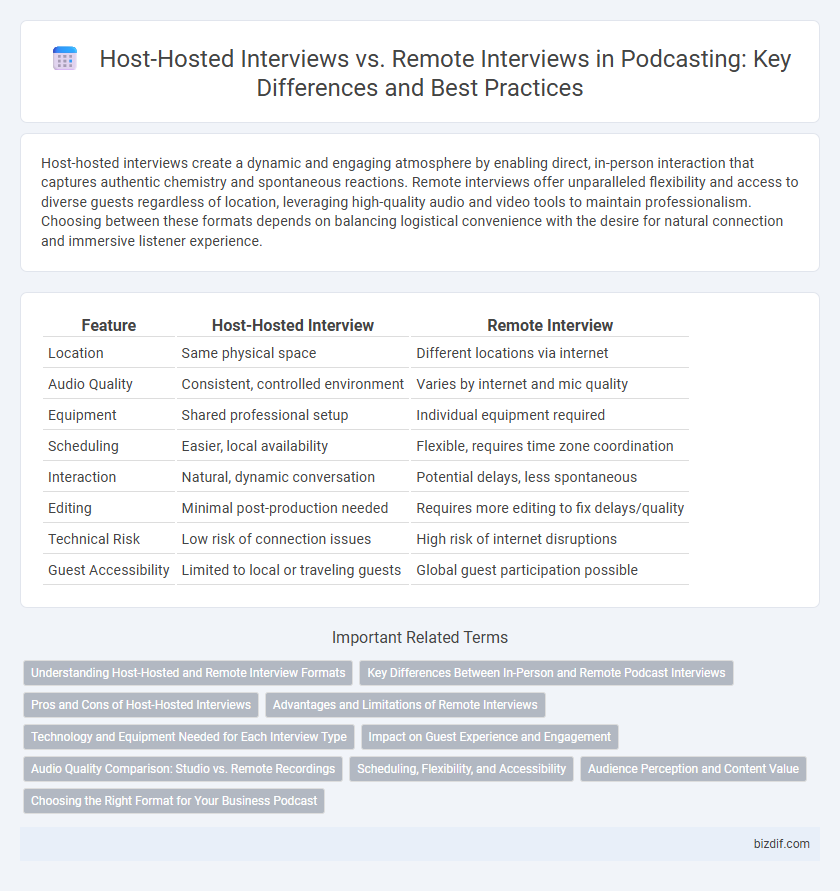Host-hosted interviews create a dynamic and engaging atmosphere by enabling direct, in-person interaction that captures authentic chemistry and spontaneous reactions. Remote interviews offer unparalleled flexibility and access to diverse guests regardless of location, leveraging high-quality audio and video tools to maintain professionalism. Choosing between these formats depends on balancing logistical convenience with the desire for natural connection and immersive listener experience.
Table of Comparison
| Feature | Host-Hosted Interview | Remote Interview |
|---|---|---|
| Location | Same physical space | Different locations via internet |
| Audio Quality | Consistent, controlled environment | Varies by internet and mic quality |
| Equipment | Shared professional setup | Individual equipment required |
| Scheduling | Easier, local availability | Flexible, requires time zone coordination |
| Interaction | Natural, dynamic conversation | Potential delays, less spontaneous |
| Editing | Minimal post-production needed | Requires more editing to fix delays/quality |
| Technical Risk | Low risk of connection issues | High risk of internet disruptions |
| Guest Accessibility | Limited to local or traveling guests | Global guest participation possible |
Understanding Host-Hosted and Remote Interview Formats
Host-hosted interviews involve both the interviewer and guest being physically present in the same studio, fostering natural rapport and superior audio quality through controlled environments. Remote interviews rely on digital platforms, allowing participants to connect from different locations, increasing flexibility but often requiring robust internet connections and technical setups to maintain sound clarity. Understanding these formats enables podcasters to choose between authentic live dynamics or convenient remote accessibility based on content goals and resource availability.
Key Differences Between In-Person and Remote Podcast Interviews
In-person podcast interviews offer superior audio quality and enable natural, dynamic interactions through face-to-face communication, enhancing listener engagement. Remote interviews provide convenience and flexibility, allowing participants to connect from diverse locations using platforms like Zoom or Riverside.fm, though they may encounter latency and technical issues affecting flow. Crucial differences include control over environment, spontaneity of conversation, and post-production editing based on audio clarity.
Pros and Cons of Host-Hosted Interviews
Host-hosted interviews enable seamless interaction and natural conversation flow by allowing real-time feedback and body language cues, enhancing audience engagement. This format requires co-location, which can limit guest availability and increase logistical challenges compared to remote interviews. Technical quality is often more consistent in host-hosted settings, reducing audio dropouts and synchronization issues common in remote recordings.
Advantages and Limitations of Remote Interviews
Remote interviews in podcasting offer significant advantages such as enabling access to diverse guests regardless of geographic location, enhancing scheduling flexibility, and reducing travel costs and time commitments. Limitations include potential technical issues like audio quality variability and internet connectivity disruptions, which can impact listener experience and require more post-production effort. Despite these challenges, remote interviews remain a vital tool for podcasters aiming to broaden audience reach and maintain consistent content output.
Technology and Equipment Needed for Each Interview Type
Host-hosted interviews typically require professional-grade microphones, sound mixers, and a reliable in-studio recording setup to ensure optimal audio quality. Remote interviews rely heavily on digital communication platforms such as Zoom, Skype, or Riverside.fm, with participants using USB microphones, headphones, and stable internet connections to minimize latency and audio degradation. Both formats benefit from noise-canceling software and post-production editing tools to enhance clarity and listener experience.
Impact on Guest Experience and Engagement
Host-hosted interviews create a more immersive and authentic atmosphere by enabling real-time interaction, fostering stronger guest engagement through immediate feedback and natural conversation flow. Remote interviews often rely on technology that can introduce delays or technical issues, potentially disrupting the guest's comfort and reducing their ability to engage fully. Quality audio and a stable connection remain critical factors in ensuring positive guest experience regardless of the interview format.
Audio Quality Comparison: Studio vs. Remote Recordings
Studio recordings in host-hosted interviews typically deliver superior audio quality due to controlled acoustics and professional equipment, minimizing background noise and ensuring clarity. Remote interviews often face challenges such as inconsistent internet connections, variable microphone quality, and ambient distractions, which can degrade sound fidelity. Optimizing remote setups with high-quality microphones and soundproofing techniques can narrow the audio quality gap compared to studio environments.
Scheduling, Flexibility, and Accessibility
Host-hosted interviews offer synchronized scheduling and real-time interaction, enhancing communication and spontaneity during podcast recordings. Remote interviews provide greater flexibility by allowing participants to join from any location, accommodating diverse time zones and busy schedules. Accessibility is improved remotely through digital platforms that support high-quality audio and video, making it easier to include guests who cannot travel to the studio.
Audience Perception and Content Value
Host-hosted interviews foster a dynamic and engaging atmosphere that enhances audience connection through real-time interaction and chemistry, often perceived as more authentic and immersive. Remote interviews provide greater flexibility and access to diverse guests but can sometimes result in technical challenges or reduced spontaneity, impacting audience engagement. The perceived content value in host-hosted formats typically rises due to seamless dialogue flow, while remote interviews offer broader perspectives, enriching the podcast's informational depth.
Choosing the Right Format for Your Business Podcast
Host-hosted interviews create a controlled environment that enhances sound quality and allows for natural interaction, making them ideal for local or in-person podcast production. Remote interviews offer flexibility, enabling businesses to access diverse experts and guests worldwide regardless of location, which expands content variety and audience reach. Selecting the right format depends on your podcast's goals, budget, and the importance of audio fidelity versus geographical guest availability.
Host-Hosted Interview vs Remote Interview Infographic

 bizdif.com
bizdif.com